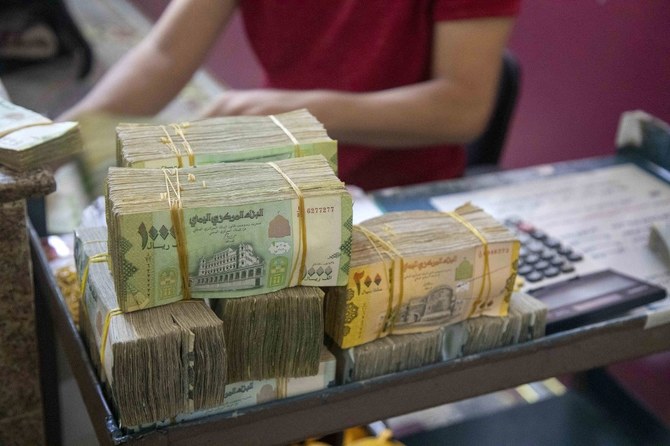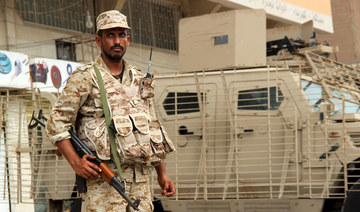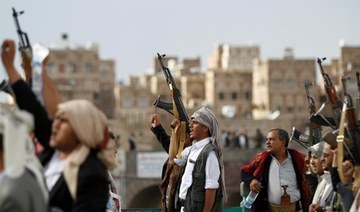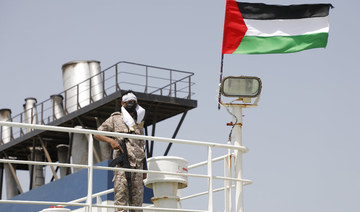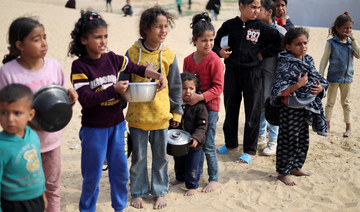AL-MUKALLA: The Yemeni riyal began plummeting in government-controlled areas this week, days after the head of the Presidential Leadership Council said his government will be unable to pay public employees due to Houthi strikes.
The riyal was exchanged at 1,200 per dollar in Aden, Al-Mukalla and other liberated areas on Tuesday compared to 1,170 last week, erasing months of improvement over the previous nine months.
In April, the value of the riyal increased by around 13 percent, rising to over 1,000 against the dollar from around 1,260 after the UN-brokered ceasefire went into force and the presidential council was formed.
The riyal sustained its recovery in the months after the founding of the council and the announcement of the Saudi and Emirati contribution of $3 billion to the Yemeni economy.
Traders said this week that the riyal started to decline apparently in response to Rashad Al-Alimi’s warning last week that the government will not pay public workers on its territory because Houthi drone attacks on oil installations in Hadramout and Shabwa had halted oil exports, the government’s principal source of income.
Previous waves of currency devaluation in Yemen have driven up the costs of gasoline, transportation, food and other essentials, exacerbating the already dire humanitarian catastrophe and driving millions of Yemenis to starvation.
In October, the Houthis started attacking oil facilities in Hadramout and Shabwa in an effort to compel the government to accept their demand of sharing oil earnings and paying public personnel in regions under their control who had not been paid since late 2016.
Mustafa Nasr, director of the Economic Media Center, told Arab News on Tuesday that the current devaluation of the riyal is expected in the wake of Houthi strikes, and that the currency may fall further if the central bank exhausts its foreign currency reserves.
“Given the cessation of oil shipments from the ports, the drop is expected. Due to the existence of certain cash reserves at the central bank, the current degree of deterioration is within normal bounds,” Nasr said.
“However, the scenario would be disastrous if the central bank stops selling the currency, and the riyal will drastically depreciate.”
The riyal was valued at 250 per dollar at the beginning of 2015, and hit an all-time low of 1,700 per dollar in December 2021.
Among other measures, the government shut down unlicensed exchange firms and firms engaged in currency transactions, provided local traders and importers with dollars, and requested that Sanaa-based financial institutions relocate their operations to Aden in order to prevent the devaluation of the riyal.
The latest devaluation comes as the UN painted a bleak picture of Yemen’s humanitarian situation in 2023, estimating that 21.6 million Yemenis — 75 percent of whom are women and children — out of the country’s 32.6 million population will require humanitarian assistance, with 13.4 million requiring immediate assistance.
In its Humanitarian Needs Overview published on Tuesday, the UN Office for the Coordination of Humanitarian Affairs said 20.3 million Yemenis will need assistance to access vital health services, 17.3 million will need food assistance, 15.3 million will need assistance to access clean water and meet basic sanitation needs, and 2.2 million children will need nutrition support.
The UN said the depreciation of the riyal will continue in the next year due to the drop in money transfers from outside, as well as the decline in foreign currency reserves and oil exports.
“The significant reduction in remittances, oil exports and foreign currency reserves, coupled with the division in the country’s governmental financial structures, will be the main drivers of a continued depreciation of the YER (riyal),” OCHA’s report said.



